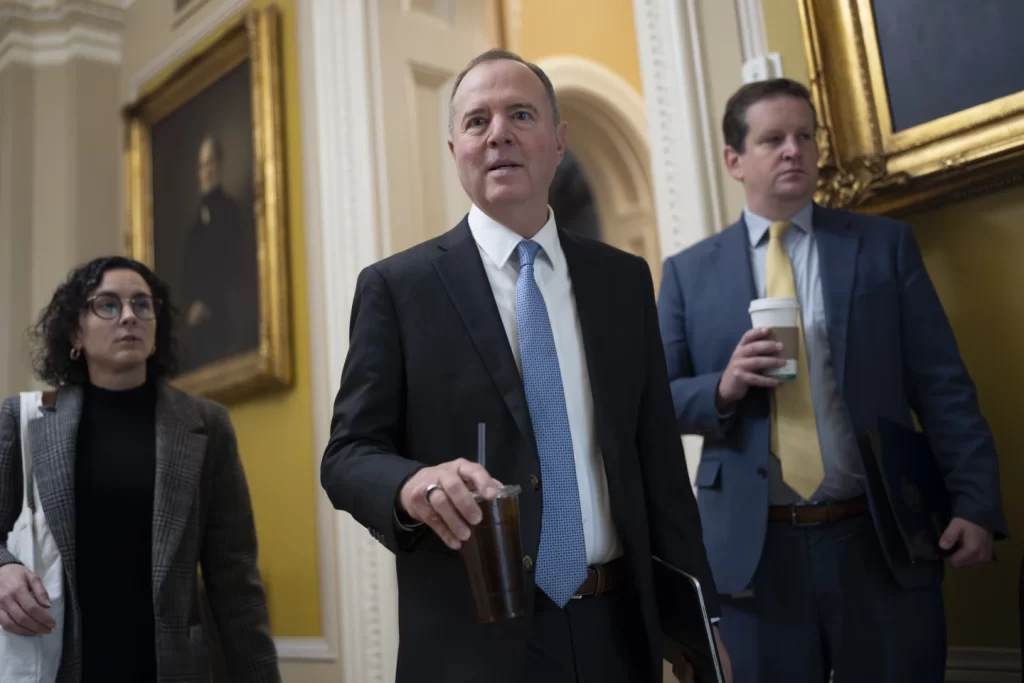
WASHINGTON — Democrat Adam Schiff stood on the Senate floor almost five years ago as a House impeachment manager and made a passionate case that Donald Trump should be removed from office for abusing the power of the presidency. “If right doesn’t matter, we’re lost,” he told the senators, his voice cracking at one point.
The Republican-led Senate wasn’t convinced, and senators voted to acquit Trump on the Democratic-led impeachment charges over his dealings with Ukrainian President Volodymyr Zelenskyy. Trump would survive a second impeachment a year later after his supporters stormed the Capitol and tried to overturn his defeat.
Now Trump is headed back to the White House, politically stronger than ever and with a firm hold over what will be a unified Republican Congress. And Schiff, one of Trump’s biggest foils, was sworn into the Senate on Monday as part of a Democratic caucus that is headed into the minority and has been so far restrained in opposing the returning president, taking more of a wait-and-see approach in the weeks before he is sworn into office.
As California’s newest senator, Schiff says he’s not going to shy away from familiar territory — opposing Trump when he feels it necessary. But he’s also hoping to be known for bipartisanship, as well, after campaigning in Republican areas of his state and working to learn more about rural issues that weren’t in his portfolio in his urban Los Angeles House district.
“I think being there and letting folks get to know me, kick the tires a bit, helps overcome some of the sort of Fox News stereotypes,” Schiff said of the conservative news channel’s focus on him as he challenged Trump in his first term. He says he also sees that outreach as a way to gain insight into Democrats’ way forward after losses in the November elections.
Schiff was sworn in weeks before the new Congress convenes on Jan. 3 because he is filling the seat of longtime Democratic Sen. Dianne Feinstein, who died last year. He is entering the Senate alongside Democratic House colleague Andy Kim of New Jersey, who is filling the term of former New Jersey Sen. Bob Menendez after he was convicted on federal bribery charges and resigned.
Bipartisanship was important to Feinstein, who often worked across the aisle and developed close relationships with other senators. But her work with Republicans also drew frequent criticism from California’s liberal voters.
Feinstein “was able to do a couple things simultaneously, which I’m going to need to try to do as well, and that is work with others to deliver for the state, work across party lines to get things done, and at the same time, stand up and defend people’s rights and their freedom and their values when those things are threatened,” Schiff told The Associated Press in an interview ahead of his swearing-in.
He says those priorities will frequently be at odds in the era of Trump, “and so I’ll have to try to do both.”
Democratic Sen. Brian Schatz of Hawaii, who has spent time with Schiff as he prepares to enter the Senate, says he thinks Schiff has the “right approach” in asking questions of other senators and refraining from “opining at every opportunity.”
“Everybody understands his capabilities, but he also understands that he’s a freshman,” Schatz says, and it’s appreciated when “someone of his stature understands that he’s joining a team here.”
Still, Schiff, who was censured by House Republicans last year for his involvement in investigations into Trump’s ties to Russia, won’t be able immediately to shake his longtime role as a chief Trump antagonist. The former House Intelligence Committee chairman is more well-known than most of his fellow incoming freshmen, and he has been calling Trump out on social media in recent weeks and criticizing some of his Cabinet nominees as many of his fellow Democrats have chosen to remain quiet.
Schiff posted on X last week that FBI director nominee Kash Patel, a former GOP staffer on the House intelligence panel, is “more suited as internet troll than FBI Director” and the “Senate must reject him.”



